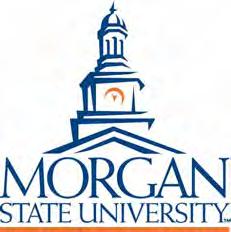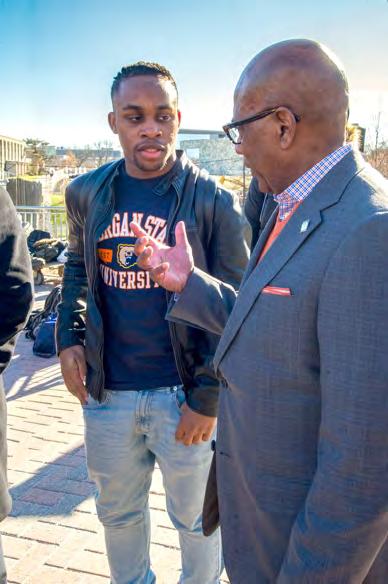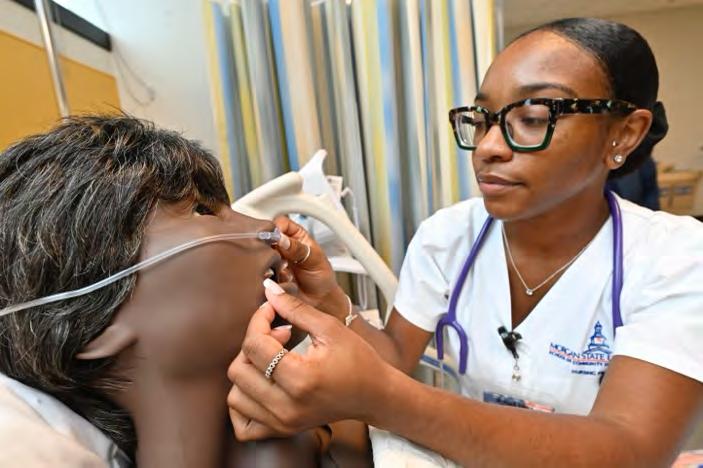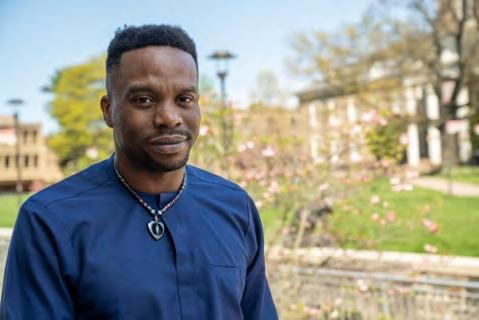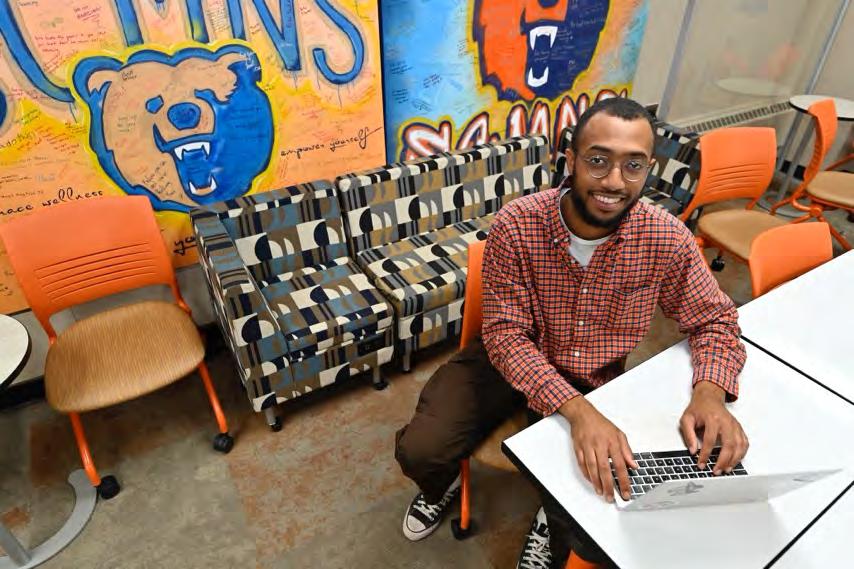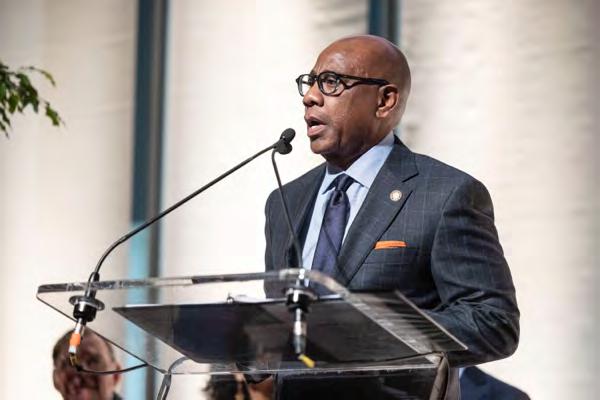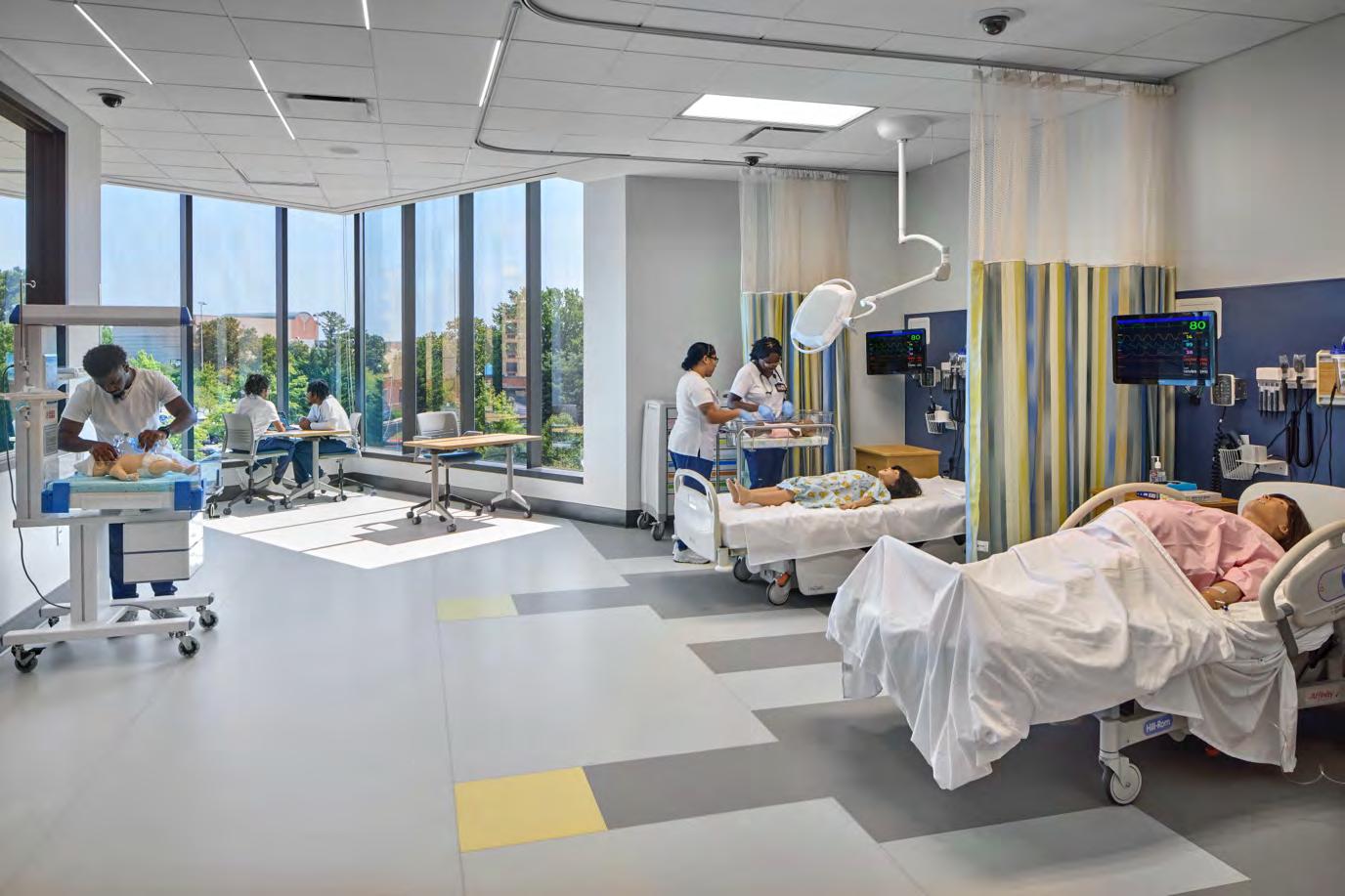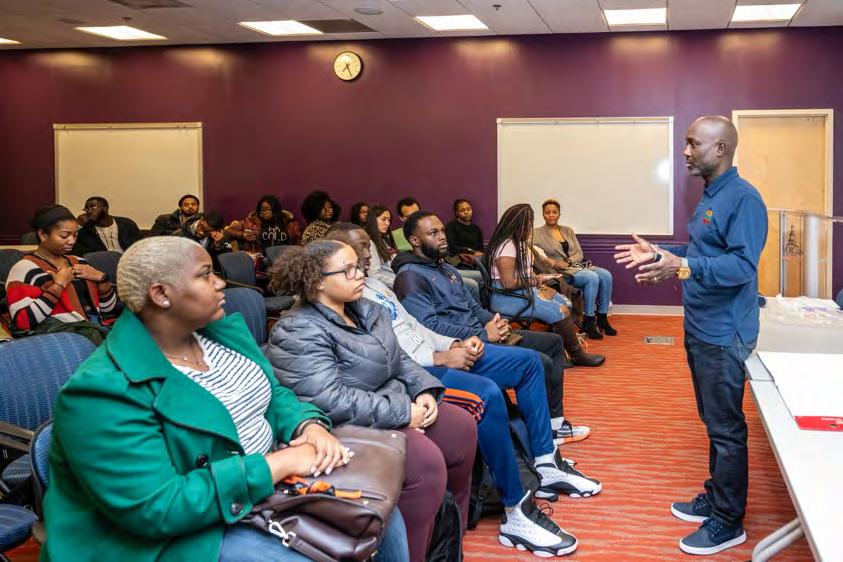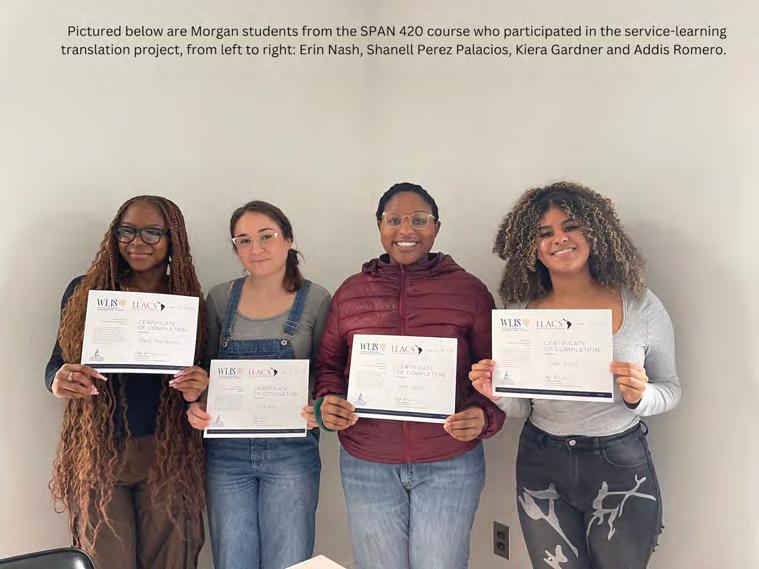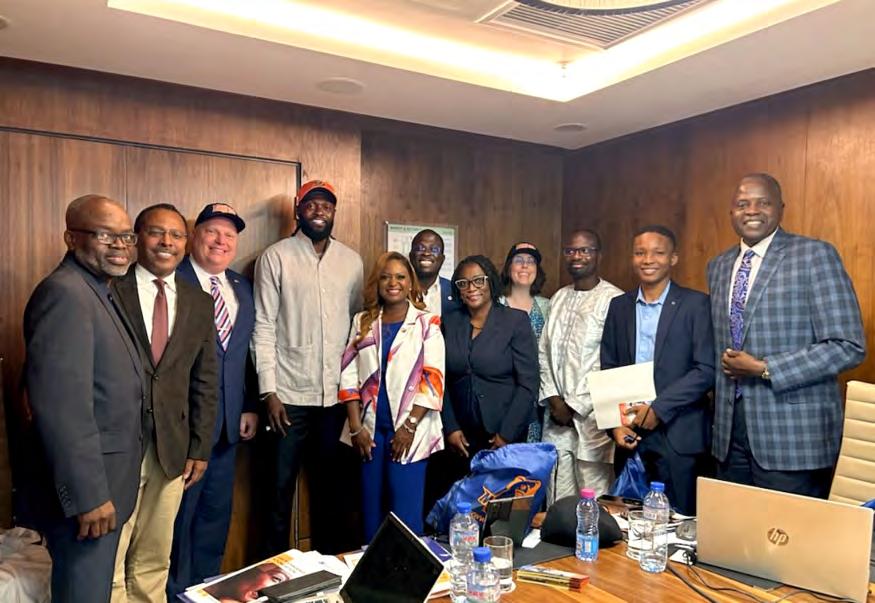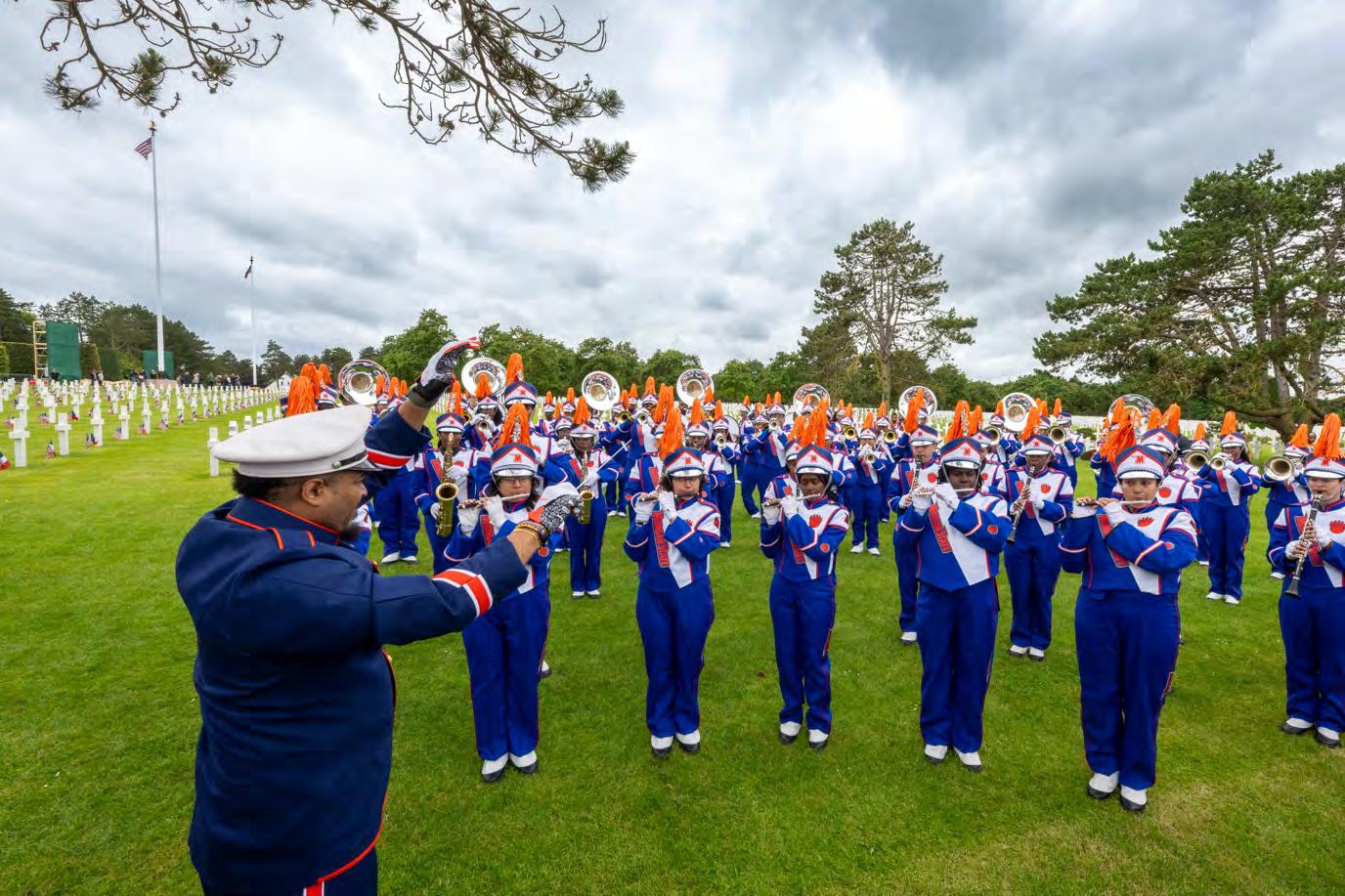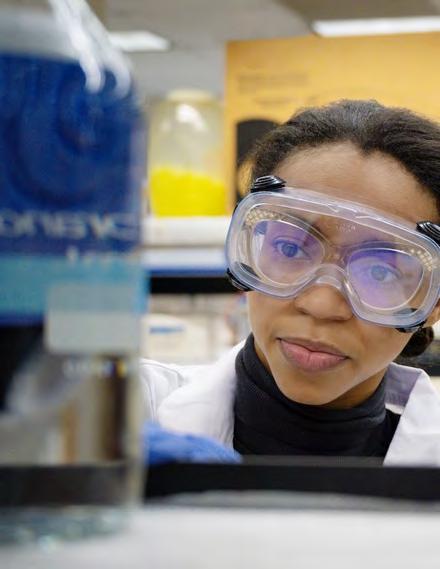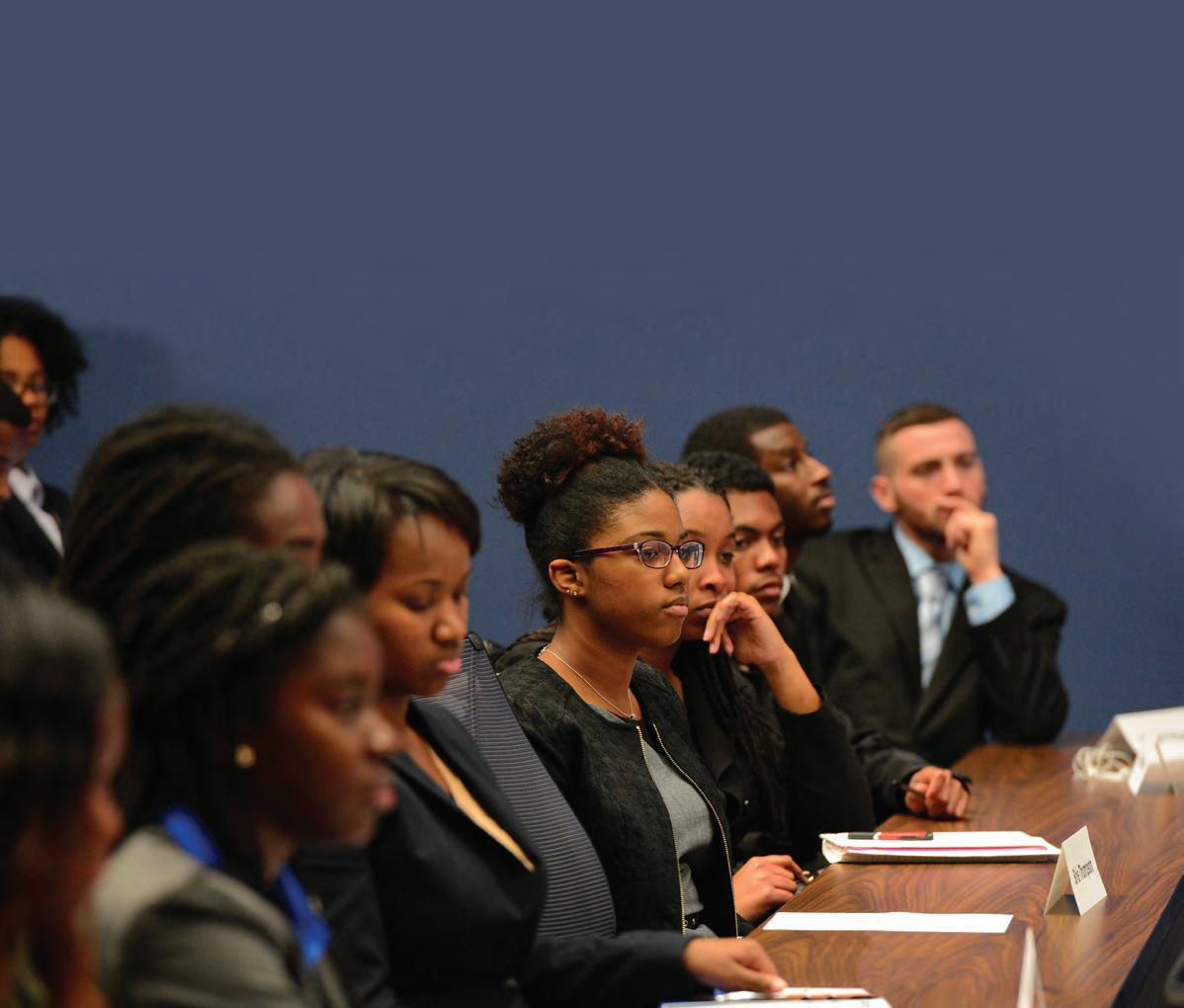Morgan State University Board of Regents
The Honorable Kweisi Mfume, Chair
Gen. Larry R. Ellis, U.S. Army (Ret.), Vice Chair
Carl W. Turnipseed, Secretary
Ms. Swati Agrawal
The Rev. Harold A. Carter Jr.
Dr. Linda J. Gilliam
Ms. Emily M. Hunter
Dr. Shirley M. Malcom
The Honorable Tracey L. Parker-Warren
Mr. Jared Patterson, Student Regent
Mr. Brian D. Pieninck
Mr. William A. Sherman II, Esq.
Ms. Shelonda D. Stokes
Mr. Winston A. Wilkinson
Dr. David Kwabena Wilson
President
Dr. Hongtao Yu
Provost and Senior Vice President, Academic Affairs
Dr. Don-Terry Veal
Vice President, State and Federal Relations and Chief of Staff
President’s Senior Administration
Ms. Dena Freeman-Patton
Vice President and Director, Intercollegiate Athletics
Ms. Julie Goodwin
General Counsel
Ms. Armada Grant
Special Assistant to the President
Mr. David LaChina
Executive Vice President, Finance and Administration
Ms. Kim I. McCalla
Vice President for Facilities, Design and Construction Management
Dr. Cynthia Mendoza
Vice President/Chief Information Officer, Division of Information Technology (Interim)
Dr. Kara M. Turner
Vice President, Enrollment Management and Student Success
Dr. Kevin Banks
Vice President, Student Affairs
Ms. Endia DeCordova
Vice President, Institutional Advancement
Mr. Abraham Mauer
Director, Internal Audit and Management Review
Dr. Willie E. May
Vice President, Research and Economic Development
TESTIMONY
Fiscal
Year 2026 Operating Budget
Morgan State University
David K. Wilson, President
February 2025
Chair and members of the Committee, I thank you for the opportunity to testify on the Governor’s fiscal year 2026 budget allowance for Morgan State University (MSU) and to provide you with an update on the remarkable progress and achievements at the University since the last session. It is an exciting time at Morgan, as we continue our ascent as a premier public urban research university.
I extend my deepest gratitude to Governor Moore for his unwavering support of higher education and to the members of the General Assembly, particularly this Committee, for your steadfast commitment to Morgan State University. Our analyst, Ms. Kelly Norton, has once again provided a thorough and insightful analysis of our budget, and I will address her comments and recommendations in my testimony.
Morgan State University is the premier public urban research university in Maryland, known for its excellence in teaching, intensive research, effective public service, and community engagement. Morgan prepares diverse and competitive graduates for success in a global, interdependent society.
MISSION STATEMENT
Morgan State University serves the community, region, state, nation, and world as an intellectual and creative resource by supporting, empowering and preparing high-quality, diverse graduates to lead the world. The University offers innovative, inclusive, and distinctive educational experiences to a broad cross section of the population in a comprehensive range of disciplines at the baccalaureate, master’s, doctoral, and professional degree levels. Through collaborative pursuits, scholarly research, creative endeavors, and dedicated public service, the University gives significant priority to addressing societal problems, particularly those prevalent in urban communities.
INTRODUCTION
As Morgan State University boldly strides into its 158th year, we are proud to continue our role as Maryland’s Preeminent Public Urban Research University and as a National Treasure. Guided by our 10-year strategic plan, Morgan is steadfast in its commitment to fostering student success, advancing research and innovation, and uplifting the communities we serve. This mission aligns seamlessly with the Moore-Miller Administration’s 2024 State Plan and its vision to “Leave No One Behind.” As an anchor institution in Baltimore and a key driver of socioeconomic mobility, Morgan stands ready to help realize this vision by addressing inequities, expanding access, and preparing future leaders for an increasingly complex world.
The relevance of public urban research universities like Morgan has never been greater. Morgan plays a vital role in producing groundbreaking research, fueling workforce development, and driving economic growth in a rapidly evolving society. Continued investment in Morgan is not only an investment in our institution but also an investment in Maryland’s future. It is through your steadfast support that we can chart a bold course forward, ensuring that Morgan continues to rise as a leader in higher education and as a beacon of opportunity for all. Thank you for joining us on this journey of excellence and transformation
MOORE-MILLER ADMINISTRATION 2024 STATE PLAN: LEAVE NO ONE BEHIND
The Moore-Miller Administration’s 2024 State Plan was developed to lay out an implementation roadmap of the Administration’s mission to “Leave No One Behind” in Maryland, centered on the following 10 priorities:
Leave No One Behind by…
1. Ending child poverty in the State of Maryland.
2. Setting Maryland’s Students Up for Success.
3. Creating an Equitable, Robust, and Competitive Economy.
4. Connecting Marylanders to Jobs.
5. Creating Safer Communities.
6. Making the State of Maryland a Desirable and Affordable Home for All Residents.
7. Advancing Infrastructure to Better Connect All Marylanders to Opportunities and Each Other.
8. Ensuring World-Class Health Systems for All Marylanders.
9. Making Maryland a Leader in Clean Energy and the Greenest State in the Country.
10. Making Maryland a State of Service.
TRANSFORMATION MORGAN 2030: LEADING THE FUTURE
Our Strategic Plan, “Transformation Morgan 2030: Leading the Future,” reflects our continuous pursuit of excellence and a renewed commitment to fulfilling our vital mission. Our plan is firmly rooted in the realization of Morgan State University’s successful attainment of Carnegie’s R1, “very high” research classification by the year 2030, cementing our status as a leading, nationally
recognized research institution. Our plan outlines six interconnected strategic goals that give shape to, and provide a framework for, the management of needed organizational change and preparation of the University to serve and compete at the highest attainable level. Accomplishments and strides under each of the six strategic goals are highlighted below.
Enhance Student Success and Wellbeing
GOAL 1
GOAL 2
GOAL 3
Provide students with a comprehensive educational and transformative experience that actualizes their full potential and empowers them to emerge as confident and competent global citizens and dynamic leaders in their selected careers and communities.
Implement Faculty Ascendency and Staff Development Initiatives
The University will implement a broad range of human resource development initiatives for the benefit of faculty and staff.
Elevate Morgan's Status to R1 Very High Doctoral Research University
Over the next ten years, Morgan will emerge as a R1 doctoral research university fully engaged in basic and applied research and creative interdisciplinary inquiries undergirded and sustained through increased research grants and contracts.
GOAL 4
GOAL 5
GOAL 6
Expand and Improve a Campus-Wide infrastructure to Support Operational Excellence and Increase Overall Institutional Capacity
Morgan will advance new construction, capital improvement, deferred maintenance, and campus safety projects in keeping with the University's evolving master plan.
Serve as the Premier Anchor Institution for Baltimore City and Beyond Morgan will expand and deepen its role as a recognized anchor institution with broad social and economic impact.
Accelerate Global Education Initiatives and Expand the University's International Footprint
Morgan will enhance its study abroad program and promote global awareness and intercultural competencies through its diverse curricular and co-curricular programs and activities.
Goal 1: Enhance Student Success and Wellbeing
[Moore Administration Priorities Addressed: 1, 2, 3, 4 & 8]
Morgan strives to create an educational environment that enhances student success by offering new academic programs and holistic co-curricular activities in a welcoming, diverse, and inclusive campus community. Ultimately, the goal is to provide students with a comprehensive educational and transformative experience that actualizes their full potential and empowers them to emerge as confident and competent global citizens and dynamic leaders in their selected careers and communities.
§ Enrollment Growth
Six years ahead of schedule, Morgan State University has achieved and exceeded its overall goal of enrolling 10,000 students by fall 2030, recording a new, record-high total enrollment of 10,739 students in fall 2024, as reported to the Maryland Higher Education Commission. This is the fourth year in a row in which the University has achieved a record in its enrollment. The current enrollment equates to a 9.4% increase in overall enrollment over the previous year (bolstered by a 4% growth in first-year students), highlighted by the largest graduate school enrollment 1,712 students in Morgan’s history. The fall 2024 class also marks the fourth straight year in which more than 50% (51%) of the new students came from out of state, with students hailing from 41 states, the most of any new class. Morgan’s previous record enrollment stood at 9,808 in fall 2023. The University’s enrollment growth still stands among the highest percentage-wise among Maryland four-year institutions over the past several years.

• Increase in Applications – The more than 24,400 applications received for the fall semester, 96% of which came from first-time freshman applicants, reflect the interest in and enthusiasm for Morgan. When surveyed as to why they selected Morgan to attend college, nearly half of the first-year student respondents stated a desire to attend an HBCU and had Morgan at the top of their list. For the first time in more than a decade, U.S. News & World Report has ranked Morgan among the top 10 HBCUs in its “Best Colleges” rankings. Financial aid and affordability were the second leading selection factor, followed by campus and facilities and academic degree programs, which were tied for third.
• Academic Degree Program Interest – Morgan offers more than 150 academic programs leading to baccalaureate, master’s, or doctoral degrees or certificates. Since 2020, the University has added more than 30 new high-demand academic programs that address the work of the future and the future of work. In the first-year student class, the top declared majors were Nursing, Psychology, Management and Business Administration, Biology, and Computer Science.
• Graduate Student and Non-Traditional Student Gains – The School of Graduate Studies saw a 14% increase in graduate student enrollment over the previous year. Growing the number of graduate school enrollees, particularly those in the doctoral program, is another facet of the University’s strategic plan. For Morgan to achieve its goal of elevating its status to R1, becoming a “very high” doctoral research university, it must increase its number of doctoral graduates to an average of more than 70 per year. Morgan also experienced an increase in the number of new students enrolled in the College of Interdisciplinary and Continuing Studies’ (CICS’) “Morgan Completes You” program, an initiative to assist degree completion of nontraditional adult learners who previously earned some college credits. CICS enrolled 162 students for the fall semester, with a goal of enrolling 350 students by Fall 2025.
§ Student Financial Support
Morgan, by way of the Morgan State University Foundation (MSUF), awarded a recordtopping $5.8 million in scholarships to 2,560 students during fiscal year 2024. This historic year of philanthropic achievement represents the Foundation’s largest number of scholarship recipients and funding awarded in an academic year. This milestone underscores the Foundation’s unwavering commitment to advancing educational opportunities and supporting the academic pursuits of Morgan students. The previous record for Foundation scholarships awarded stood at $5.1 million during the 2022–23 academic school year. The scholarships awarded last year primarily supported undergraduate students.

The Foundation’s success in ensuring that current students were able to continue their educational pursuits uninterrupted, and that new students gained access to pursue their educational aspirations, was made possible by the extraordinary generosity of its donors. MSUF launched 10 new scholarships, bringing the total number of scholarships stewarded by the Foundation to more than 1,500. Among the new scholarships, five have been created by or are in honor of former Morgan faculty or alumni.
§ Black Male Enrollment Initiative

In response to the alarming decline in Black male enrollment at Morgan State University, as President of this consequential institution responsible for matriculating tens of thousands of Black men since its charter, I was compelled — even duty-bound — to not only work fastidiously to curb this trend but also uncover the origins, root causes and underlying nexus of the declines. To that end, I called upon the exceptional intellectual capital amassed here at Maryland’s Preeminent Public Urban Research University to form a Presidential Task Force on the State of Black Male Enrollment at Morgan. This initiative will examine the underlying causes of declining enrollment and retention of Black males in higher education, while developing actionable solutions to reverse the trend at Morgan and possibly across HBCUs nationwide. The formation of the task force follows the recent release of data from the American Institute for Boys and Men (AIBM), which highlights a 25% drop in Black male enrollment at HBCUs since 2010, a rate exceeding the 22% decline seen across all U.S. higher education institutions. While Morgan has continued to set record-breaking total enrollment figures, becoming the nation’s third-largest HBCU last fall, its percentage of Black male students has decreased from 43% in 2015 to 37% in fall 2024, mirroring national trends. For a myriad of reasons, this issue is a critical concern for me and Morgan’s campus community; our capacity to deliver evidence-based solutions to address it is paramount
§ Student Success Innovation Backed by NISS
Morgan’s Division of Enrollment Management and Student Success (EMASS) received a $1.5million Acceleration Grant from the National Institute for Student Success (NISS), focused on improving student retention and increasing graduation rates. By collaborating with other offices throughout the University, EMASS provides essential support to guide students through enrollment and academic processes, including managing financial aid and academic advisement. The grant will help the University standardize academic advising systems and protocols to ensure students receive consistent, proactive support across all advising units and colleges. It also strengthens the ability of student support offices to make proactive, data-informed decisions by providing better access to vetted, timely, and operational data that support students from diverse backgrounds facing academic progression challenges.

NISS, a recognized higher education leader in enhancing graduation rates and reducing equity gaps, collaborates with colleges and universities to identify obstacles to degree completion and implement proven solutions for student success. The funding provided by the NISS grant will be instrumental in advancing the University’s student advising capabilities. Resources will be allocated toward enhancing and expanding student advising teams’ training and learning opportunities. A key focus will be leveraging predictive analytics to empower advisors to manage enrollment more effectively and provide personalized student support. The expanded training program will ensure that all student advisors receive comprehensive and up-to-date training that aligns with best practices in student success.
§ Education-to-Career Pathways Strengthened
Morgan’s Center for Career Development has been awarded a $300,000 grant from the Strada Education Foundation in partnership with the American Association of State Colleges and Universities (AASCU) and the Association of Public and Land-Grant Universities (APLU). The grant will support efforts to scale innovative career guidance strategies, expand employer connections, and enhance mentorship and leadership development opportunities for first-year, first-generation students. Morgan, an AASCU member university, is one of only eight institutions selected for this prestigious grant. The funding will also contribute to research and best practices that can be shared with the broader higher education career services community. The funding is part of Strada’s Innovation in Career Services grant program, designed to help university career services departments implement and evaluate new approaches to career readiness.
§ Nursing Program Reaccredited
Following a comprehensive and exhaustive review of the programmatic offerings, preparation initiatives, and real-world training of Morgan State University’s undergraduate nursing students, the Commission on Collegiate Nursing Education (CCNE) has extended the accreditation of the School of Community Health and Policy’s Department of Nursing baccalaureate degree program for a maximum 10-year term. The reaccreditation of Nursing’s undergraduate program comes at an opportune time in the department’s ascendency, as enrollment interest remains high and as FY24 graduates posted a first-time pass rate of 90.3%. The term of this most recent round of accreditation extends until 2033.
§ National Ranking
Morgan State University’s Earl G. Graves School of Business and Management (Graves School) has earned a spot among the nation’s top business schools, ranking 60th overall in Bloomberg Businessweek’s 2024–2025 Best BSchools list. This marks the school’s first appearance in the rankings and makes Morgan the only Historically Black College or University (HBCU) to earn an official ranking, and one of just two Maryland institutions recognized on the prestigious list. The Bloomberg recognition follows on the heels of U.S. News & World Report’s ranking of Morgan State University as 10th overall among the nation’s best HBCUs.
The Graves School of Business and Management is widely recognized for its academic excellence and historical significance as the first AACSB-accredited business school at a public institution in Maryland. Consistently ranked among the top five business schools in the state, it is also positioned within the top 15% of business schools nationwide. The Graves School also holds the distinction of being Morgan’s largest academic unit, accounting for 21% of the University’s total student enrollment. This reflects both the growing interest in its dynamic academic programs and its critical role in shaping the next generation of business professionals and entrepreneurs.
§ Student Excellence (Recognition and Honors)
A number of exceptional Morgan State University students have earned national recognition, awards, and honors over the past year. These scholars exemplify Morgan's commitment to excellence as they embark on prestigious fellowships, gain invaluable experiences, and receive scholarships that support their academic journeys at the National Treasure.
Representing Morgan on a national stage, these students showcase the ambition, intellectual curiosity, and academic achievement that define our diverse student body. The University is proud to celebrate their remarkable accomplishments as they continue to meaningful contributions to their respective fields. Their success reflects Morgan’s unwavering dedication to academic excellence and its rise as a premier institution of higher learning.
• Maitland P. Simmons Memorial Award for New Teachers
The National Science Teaching Association (NSTA) has bestowed its 2024 Maitland P. Simmons Memorial Award for New Teachers to Morgan State University graduate student Olisa Menakaya. The annual award honors NSTA members who have made extraordinary contributions to the field of science teaching in their first five years of professional instruction. Menakaya now serves as a chemistry teacher at Springbrook High School in Silver Springs, Maryland, and is pursuing a doctoral degree in science education at Morgan’s School of Education and Urban Studies.
• Astronaut Scholar
Morgan student Tyler Austin, a senior Computer Science major from the School of Computer, Mathematical and Natural Sciences (SCMNS), was named to the 2024 class of Astronaut Scholars by the Astronaut Scholarship Foundation (ASF). Austin is Morgan’s fourth ASF scholarship award winner over the last five years and was recently honored along with more than 70 Astronaut Scholars throughout the U.S. at ASF’s Innovators Symposium & Gala.
ASF’s Astronaut Scholarship is offered to junior- and senior-year college students pursuing degrees in STEM. Upon selection, each student receives a scholarship of up to $15,000 and other benefits, including: networking and mentoring opportunities with astronauts, alumni and industry leaders; participation in the Michael Collins Family Professional Development Program; and a paid trip to attend ASF’s Innovators Symposium & Gala, featuring the Neil Armstrong Award of Excellence.
• Inaugural Actuarial Scholarship
In early 2023, Standard Insurance Company (The Standard), a leading provider of financial protection products and services, announced an exciting partnership with Morgan State University to support students pursuing degrees in actuarial science. This partnership led to the creation of a new scholarship program aimed at fostering greater diversity in the actuarial profession and providing meaningful opportunities for aspiring actuaries.
Morgan State is the only Historically Black College or University in the nation to offer a bachelor’s degree in actuarial science.
The first recipient of The Standard’s actuarial scholarship is Jeremiah Creasey, a first-year student at Morgan who aspires to build a successful career as an actuary in the insurance industry. Jeremiah was awarded a renewable, four-year scholarship valued at $5,000 annually, totaling $20,000 over his undergraduate career.
In addition to financial support, the scholarship program includes a paid internship at The Standard, enabling participants to gain hands-on industry experience. Interns earn income while working part time during the school year or full time over the summer, exploring how actuarial science is applied in real-world scenarios. They also gain insight into The Standard’s organizational culture and career opportunities. Jeremiah is set to intern at The Standard during the summer of 2025.
• Benjamin A. Gilman International Scholarship
Two Morgan State University students Estelle Georges (sophomore) and Joyce Nagbe (sophomore) were selected to receive the prestigious Benjamin A. Gilman International Scholarship. Through the highly competitive program, sponsored by the U.S. Department of State, both have received funding to participate in international learning opportunities. Each received a $3,000 scholarship to study or intern abroad and complete a Follow-on Service Project. Estelle Georges, who is majoring in accounting at the Earl G. Graves School of Business and Management, used her scholarship to embark on a transformative academic journey to Seville, Spain. Joyce Nagbe, a nursing major in the School of Community Health and Policy, will pursue her studies in Africa.
• Inaugural Knight Science Journalism Fellowship @ MIT
The Knight Science Journalism Program at MIT selected two students from Morgan State University’s School of Global Journalism and Communication from a nationwide pool of candidates to participate in a new fellowship. The HBCU Science Journalism Fellowship identifies promising students from Historically Black Colleges and Universities interested in reporting on science, health, and environmental issues and provides them
with training, mentorship, and early career support. Zoe Earle and Utrurah Whitley, both Multimedia Journalism majors at Morgan, joined an inaugural cohort of 10 talented journalism students representing five of the country’s top HBCUs.
The fellowship kicked off with a weeklong science journalism summer camp at MIT, where fellows learned from award-winning science journalists, met editors from leading science publications and developed their skills in interactive workshops. Over the year, each fellow will be mentored by a professional science journalist, who will work with them to pitch stories to national and regional science publications. Each fellow will also receive a $5,000 stipend.
• Outstanding Future Professional Award in Health and Physical Education
As Morgan State University continues to rise as one of the nation’s fastest-growing research institutions, its students are earning recognition for their academic excellence and career preparation. Adding to these accolades, seniors Jaiden Gomez and Eboni Singletary, both majoring in the School of Education and Urban Studies’ Sports Administration and Movement Education program (formerly Physical Education), received the Society of Health and Physical Educators (SHAPE) Maryland’s Outstanding Future Professional Award. This prestigious award celebrates their commitment to health and physical education, leadership, and academic distinction. Awarded annually, the Outstanding Future Professional Award recognizes students demonstrating exceptional potential as future leaders in health and physical education. Selections are based on academic achievement, professional involvement, and leadership in community outreach or advocacy.
§ Real-World Experience in Finance
Morgan State University’s Student-Managed Investment Fund (SMIF), launched in September, is giving Morgan Accounting and Finance majors the opportunity to manage and invest ‘real money.’ In the process, the students gain real-world portfolio management knowledge and experience and acquire skills in securities research, stock pitching, making buy/sell decisions, and preparing investment performance reports. A group of students from the Investment Club are managing the SMIF, which was seeded with initial funding of $120,000. The initiative was spearheaded by the Graves School of Business and Management in collaboration with the Morgan State University Foundation, to complement the theoretical concepts Morgan students learn in the classroom with practical skills that will distinguish them in the competitive world of finance.

Most of the seed funding came from Morgan students’ winnings from national case competitions, and the remaining funds were raised by the Graves School. T. Rowe Price employees helped Investment Club members prepare for the program’s launch during a Student-Managed Investment Fund Boot Camp held last year. They taught the students how to build a “three-statement model” that used income statements, balance sheets and cash flow statements to project how companies would perform on the stock market. The SMIF managers are now using that knowledge to help their Fund track the performance of the S&P 500.
The students’ work with the SMIF is integrated with their Morgan coursework and with their activities in Morgan’s Capital Markets Lab, a state-of-the-art financial laboratory, in the Morgan Business Center, which delivers real-time market data feeds, news and news analysis from exchanges, brokerage houses, media, and financial services.
§ National Selection
In the follow-up to a momentous performance in France as the first-ever HBCU to participate in the annual D-Day memorial parade, Morgan State University’s Magnificent Marching Machine marching band will add another historic first to its already impressive list of achievements. During a special halftime presentation at Morgan’s 2024 Homecoming football game, the Magnificent Marching Machine, led by Director of Bands Jorim E. Reid Sr., D.M.A., announced before thousands of attendees and supporters that the band has been selected by the Pasadena Tournament of Roses Association to perform in the 137th in 2026.
Goal 2: Implement Faculty Ascendency and Staff Development Initiatives
[Moore Administration Priorities Addressed: 2, 3, 4 & 10]
In addition to fostering student excellence, Morgan State University actively supports its faculty and staff in all forms of scholarship, from advancing knowledge in teaching and learning to developing innovative products and processes. The University is home to some of the most distinguished and recognized faculty in higher education.
Morgan not only attracts top faculty from around the world but also celebrates their achievements as they earn recognition from esteemed organizations such as the American Association for the Advancement of Science, the Nigerian Academy of Letters, the American Council of Learned Societies, and the American Educational Research Association. Their contributions further elevate Morgan’s reputation as a leader in academic excellence and innovation.
§ Three New American Association for the Advancement of Science Fellows Named
Three esteemed Morgan State University faculty members were elected fellows of the American Association for the Advancement of Science (AAAS), the world’s largest general scientific society and publisher of the Science family of journals. Paul B. Tchounwou, D.Sc., Kevin T. Kornegay, Ph.D., and Farin Kamangar, Ph.D., M.D., each recognized for their advancement of science and service to society spanning their accomplished careers, were named to the 2023 class of AAAS Fellows comprising 502 scientists, engineers, and innovators from around the world and across 24 disciplines. Election as an AAAS Fellow is one of the most distinguished honors within the scientific community. All three were elected by the AAAS Council under the affiliated section of Industrial Science and Technology.
§ APS Forum on Diversity and Inclusion Fellow
Among those leading the charge and doing the work to enhance minority participation and qualification in the STEM fields is Willie S. Rockward, Ph.D., chair and professor of Physics and Engineering Physics at Morgan. During his 30-year career as a professional in academia and government, the HBCU graduate has developed expertise in fields ranging from nanolithography and terahertz imaging to extreme ultraviolet laser light and spectroscopic analysis of binary star systems. However, his decades-long quest to increase diversity and inclusion in STEM, particularly in his chosen field of physics, where less than 1% are reported to be Black, has earned him his most recent honor. The American Physical Society (APS) has named Dr. Rockward one of the prestigious organization’s four Forum on Diversity and Inclusion Fellows for 2024. The fellowship recognizes his “exemplary leadership, dedication, mentoring, and service to the physics community that has increased diversity and advanced inclusive practices in physics.”

§ Nigerian Academy of Letters Fellow
The Nigerian Academy of Letters (NAL) Board of Fellows has elected Morgan State University’s Hakeem Ibikunle Tijani, Ph.D., professor of history and executive director of the Division of International Affairs’ Office of Global Partnerships–Africa, as one of the Academy’s new fellows. The highly competitive and distinguished honor recognizes Dr. Tijani’s outstanding contributions to history and humanities in Nigeria and globally. The Nigerian Academy of Letters fellowship is one of the highest academic honors in Nigeria, awarded annually to a select group of full professors who have held the rank for at least a decade. Candidates are rigorously evaluated based on their academic publications, teaching, global service to humanity, and contributions to advancing knowledge in their field. Only one fellow is elected annually in each area of specialization, making this achievement particularly significant. The NAL Board of Fellows recognized Dr. Tijani for challenging hegemonic historiography and for his groundbreaking work on the nationalist movements, decolonization processes, and liberation struggles in British West Africa during the Cold War era.

§ AERA 2024 Award Winner in Education Research
The American Educational Research Association (AERA) the largest national interdisciplinary research association devoted to the scientific study of education and learning named Morgan State University’s Camika Royal, Ph.D., is the recipient of its 2024 Award for Excellence in Education Research. Dr. Royal, who serves as associate professor of Urban Education Leadership and program director for the Department of Advanced Studies, Leadership, and Policy in the School of Education and Urban Studies, was recognized in the category of “Outstanding Book” by AERA. The Outstanding Book Award was established to acknowledge and honor the year’s best book-length publication in education research and development. Dr. Royal was included among 15 educators representing institutions nationwide, and one standout journalist, distinguished for their diverse contributions to and impacts on higher education. Dr. Royal’s seminal work examined the Philadelphia educational system, providing extensive, expert analysis of the intersection of race and education.

§ Inaugural American Council of Learned Societies HBCU Faculty Grant Award
The American Council of Learned Societies (ACLS) has selected Morgan State University’s Gonzalo Baptista, Ph.D., as one of its 12 inaugural 2024 ACLS HBCU Faculty
§ National Science Board Presidential Appointee
Providing another significant boost toward Morgan State University’s status as a national leader among public research institutions, President Joe Biden appointed Morgan’s vice president for Research and Economic Development, Willie E. May, Ph.D., to the National Science Board. With the six-year appointment, effective Oct. 23, 2024, Dr. May joined the 23 other leaders in academia, government, and the private sector who make up the prestigious board, which serves as the governing body of the National Science Foundation (NSF) and as an independent advisor to Congress and the U.S. president on policy matters related to science, technology, engineering, and mathematics (STEM) research and STEM education. Dr. May’s work with the National Science Board was concurrent with his leadership of the American Association for the Advancement of Science (AAAS) as the association’s 2004 president.

§ President David Wilson Named to National Boards and Recognized as 2024 Most Admired CEO and Maryland Higher Ed Power Player
Yours truly, Morgan State University President David K. Wilson, was chosen to serve on the boards of two nationally recognized organizations. I was recently selected for the T. Rowe Price Charitable Board of Directors and the TIAA Board of Governors. T. Rowe Price Charitable is an independent, nonprofit public charity that sponsors national donor-advised funds, and TIAA is a leading provider of secure retirements and outcome-focused investment solutions serving millions of people and thousands of institutions.
I was also honored by the Maryland Daily Record as a 2024 Most Admired CEO and one of Maryland’s power players on the 2024 Higher Education Power List.
Goal 3: Elevate Morgan’s Status to R1 Very High Doctoral Research University
[Moore Administration Priorities Addressed: 3, 4, 5, 6, 7, 8, 9 & 10]
As Morgan State University advances its mission to achieve R1 (Carnegie “Very High Research Activity”) status, significant strides are being made to expand the institution’s research enterprise and national standing. Central to this effort is the dedication of our faculty and research staff, whose contributions are driving unprecedented growth in funded research and innovation. In FY 2024, Morgan secured a record-high $88.5 million in new federal research and training commitments a 6% increase over the previous year and the third consecutive year of historic funding growth. Morgan researchers continue to secure competitive grants from a range of federal agencies, including the National Science Foundation, Department of Defense, Department of Transportation, Department of Education, Department of Commerce, and Health Resources and Services Administration, among others. These investments underscore Morgan’s rising prominence as a leading research institution and reinforce the University’s commitment to advancing knowledge, fostering innovation, and achieving R1 status.
MORGAN STATE UNIVERSITY
Institute for Urban Research
RESEARCH CENTERS
Patuxent Environmental and Aquatic Research Laboratory (PEARL)
Cybersecurity Assurance and Policy (CAP) Center 2018
Center for Urban Health Equity 2021
Center for Data Analytics and Sports Gaming Research 2022
Center for Equitable Artificial Intelligence and Machine Learning Systems 2022
Center for Urban Violence and Crime Reduction 2022
National Center for the Elimination of Educational Disparities 2023
Center for Education and Research in Microelectronics 2023
Center for Urban and Coastal Climate Science Research 2024
§ On Pace to Reach $100M Annual Research Grant Target and R1 Classification
Morgan’s Division of Research and Economic Development (D-RED) reported a record-high of $88.5 million in new federal funding commitments for University research and training — a 6% increase over the previous year — and $50 million in research expenditures for Fiscal Year 2024 (FY24). This marks the fourth consecutive year Morgan has netted increases in sponsored research commitments, excluding any private gifts. Both achievements further advance the University toward its goal of obtaining an R1 (very high research activity) Carnegie classification.
During FY24, Morgan researchers submitted 331 new proposals requesting more than $226 million in funding from an array of U.S. federal agencies, including the Department of Transportation, National Science Foundation, Department of Defense, Department of Energy and National Institutes of Health, among others. The University received 160 new funding commitments from proposals submitted this and last academic year, worth $88.5 million. Coincidingly, the University reached a targeted $50 million in research expenditures. Since FY22, Morgan has consistently received $75 million or more in new awards per year.
§ Record High Single-Year Patents Awarded
Morgan has set a record among all Historically Black College Universities (HBCUs) by obtaining the highest number of patent awards in a calendar year. In 2023, MSU secured 13 patents, surpassing the previous HBCU record of 11. This accomplishment results from the University’s rapid growth in innovation and technology programs. Morgan began pursuing technology patents only eight years ago, making this an even more remarkable achievement. The annual patent increases further bolster Morgan’s efforts to become a more nationally recognized research university.

The Division of Research and Economic Development (D-RED) supports and guides MSU faculty in their research efforts by managing grants and contracts that help fund faculty research activity. In addition, the division is the first point of contact for companies interested in collaborating with MSU researchers. In 2018, the Office of Technology Transfer (OTT) was established to help faculty, staff, and students with intellectual property-related issues that may arise from their academic research or creative pursuits. As part of D-RED, the OTT assists with patent applications, trademarks and copyrights, and other intellectual property forms. To date, Morgan has been awarded 34 U.S. Patents, receiving an average award of at least one new patent per month. The University now has 3 U.S. Utility Patents pending.
§ New Climate Science Research Center Launched
Morgan State University and the State of Maryland took a significant step toward addressing the issue of climate change by establishing a new Center for Urban and Coastal Climate Science Research. The Center’s primary objective will be to work alongside the global scientific community and policymakers to develop effective solutions to mitigate the adverse implications of climate change impacting our planet. It is one of six centers that Morgan has launched over the past five years and represents one of the “Peaks of Excellence” recommended by a Blue STEM Research Expansion that the University recently convened. Funding for the new Center was included in Maryland Gov. Wes Moore’s FY25 budget for the state.

The Center will encompass various academic disciplines to advance study and address the most pressing and vexing challenges associated with climate change and its impact on natural ecosystems, the built environment, the economy, and the overall health and well-being of Maryland’s people, particularly urban and coastal populations. Through research, education, and public service, the interdisciplinary Center for Urban and Coastal Climate Science Research will produce research on climate change to benefit the City of Baltimore, Maryland, and coastal regions across the U.S. and beyond.
Specialized Biomedical Research
Morgan State University received a $20.9-million grant from the National Institutes of Health (NIH) to advance its biomedical research center. The Center for Urban Health Disparities Research and Innovation at Morgan (RCMI@Morgan) focuses on chronic conditions (like cancer, diabetes, HIV, and COVID) that disproportionately affect minority groups, especially those living in urban Baltimore. The NIH grant will be used to fund five more years of research, including upgrading laboratory technology as needed and supporting career development for junior investigators. RCMI was launched in 2019 with a $14.2-million grant-award from NIH (specifically, its division for Minority Health and Health Disparities). The Center’s investigation into chronic ailments such as cardiovascular disease, asthma, cancer, and neurological disorders has led to new prevention and treatment strategies.
§ Geoscience Diversity and Environmental Justice Efforts Enhanced Morgan State University has received funding from the National Science Foundation (NSF) to launch a two-year pilot residential bridge program this summer. The program is aimed at undergraduate students from Historically Black Colleges and Universities (HBCUs) in the MidAtlantic region pursuing degrees in humanities, behavioral, and social science, and STEM fields. The program will focus on the water crisis and its environmental impact while addressing the underrepresentation of racial and cultural minorities in the ecological career sector. This initiative is part of NSF's Geosciences Opportunities for Leadership in Diversity (GOLD-EN) program.

EN offers training in geospatial technologies like GIS and GPS, and field-based research activities, leadership workshops, and career development workshops. The program also includes campouts and urban kayaking expeditions to promote camaraderie among participants. These activities are aimed at helping participants on their journey toward graduate school programs and careers related to environmental matters.
In addition, Morgan was recently designated a regional HBCU Hub for the Environmental Justice Thriving Communities Technical Centers (EJ TCTAC), in an effort to solidify its position as a leading authority in urban environmental and climatic impacts research and study. As the hub for Region 3, which encompasses Delaware, the District of Columbia, Maryland, Pennsylvania, Virginia, West Virginia, and seven federally recognized tribes, the Morgan-led Center will utilize a mixed-methods research approach incorporating surveys, interviews, and geographic information systems, to gain a more comprehensive understanding of the collective environmental leadership of HBCUs in the Mid-Atlantic region. This research conducted under the University’s purview aims to compile information about the significant efforts made by academic professionals and environment-focused community groups in the United States to tackle environmental problems that can negatively impact human health and well-being.
§ Addressing Urban Coastline Climate Resiliency and Aquaculture Growth
Researchers at Morgan State University’s Patuxent Environmental and Aquatic Research Laboratory (PEARL) are engaging in active research programs that are improving Maryland aquaculture’s vitality and its urban coastlines’ sustainability. Toward those ends, Maryland Sea Grant (MDSG) has awarded Morgan two research grants totaling more than $600,000. The grants support PEARL’s work to advance the growth of soft-shell clam aquaculture in Maryland and promote the equitable distribution of health and climate resilience benefits by creating “blue spaces” along underserved, coast-adjacent South Baltimore communities.

The grants awarded to PEARL are part of $1.25 million in MDSG-administered federal funding from the National Oceanic and Atmospheric Administration (NOAA). One of the grants is supporting the work of PEARL’s Environmental Economics team, which plays a central role in the Baltimore BLUE-CORE: BLUE space COllaborative REsearch for Urban Coastal Access and Climate Resilience in South Baltimore Project. The second MDSG research award is underwriting two years of examination and advancement of soft-shell clam vitality by PEARL, supporting efforts to overcome a myriad of challenges faced by the shellfish (known scientifically as Mya arenaria and more commonly as “steamers”) within the Chesapeake Bay and its adjoining estuaries.
§ Road Safety Improved Through Smart Intersection Research
Morgan State University is pioneering transportation research backed by a $15-million grant from the U.S. Department of Transportation over five years. The research focuses on the development of smart, green, equitable, and safe streets for all, using technology to collect data from smart intersections around the campus. The National Transportation Center at Morgan State University is conducting the research. While the research being conducted aims to improve road safety for cyclists, pedestrians, and the handicapped, it will also address the challenges of traveling in the state after the collapse of the Francis Scott Key Bridge. The team used part of the funding received to develop a model to assess the impact of the collapse and to make recommendations to the Maryland Department of Transportation.
§ Nuclear Engineering Program Launched
The National Nuclear Security Administration has awarded Morgan State University a $5million grant to establish a comprehensive nuclear engineering program focused on developing skilled minority representative professionals with the essential knowledge and practical skills necessary for success in the rapidly evolving Nuclear Security Enterprise workforce. Over the next five years, the Scholarly Partnership in Nuclear Engineering (SPINE) project initiative will seek to significantly increase the number of graduates and postdoctoral students in the nuclear engineering field, prioritize innovative curricula, and cultivate partnerships between universities and industry leaders. Furthermore, SPINE will facilitate research opportunities and mentorship programs, ensuring students receive thorough training and guidance as they navigate their academic and professional journeys.
§ National Science Foundation Grants Support Critical Research Activity Across Multiple Disciplines
The National Science Foundation (NSF), a longstanding catalyst for groundbreaking research across the U.S. higher education landscape, granted Morgan more than $2.9 million in funding to initiate new research and further existing research. The NSF funding received thus far supports nine diverse initiatives and drives essential innovation in microelectronics, artificial intelligence, semiconductors, Internet of Things (IoT) and cybersecurity, STEM education equity, career readiness, and mobility accessibility. The awarded project funding reflects Morgan’s commitment to advancing technology, education, and social equity. The grants will support faculty in developing cutting-edge solutions and programs addressing pressing national and global challenges, positioning Morgan as a STEM- and innovationdriven research leader.
Morgan’s NSF-funded research projects include:
• Excellence in Research: Measuring the Local and Global Impact of Corporate Social Responsibility
• Collaborative Research: Ideas Lab: The HBCU Ujima Collective: Building Research Capacity at HBCUs Through a Grow Your Own Research Corps Model
• Collaborative Research: Youth Learning Science and Engineering While Developing Community-based Agency Through Resourceful Engagement in STEM (Youth CARES)
• Collaborative Research: NRT-Al: AI-driven Next-Generation Semiconductor Materials and Devices
• Project SPLICE (Security and Privacy in the Lifecycle of IoT for Consumer Environments) with Dartmouth
• Broadening Participation in Chemistry (CHE-BP) and Chemistry of Life Processes (CLP)
• Collaborative Research Project: Broadening Participation in Computing and Demonstration – Opportunities for Promoting Equity and Nurturing Academic Career-Preparation in Computing Education for Student Success (OPEN-ACCESS) at Hispanic Serving Institutions
• CIVIC-PG Track B: Night Moves – Enhancing Mobility Accessibility and Safety for Night Shift Workers in Baltimore, Maryland
• A Consortium-Based, Stacked Mentorship Model for Building Inter-Institutional Research Capacity, Access, and Collaboration
§ Leading the Advancement of Blockchain and Fintech Research and Education
The National FinTech Center at Morgan received a three-year, $1,050,000 grant from Ripple, a leader in enterprise blockchain and crypto solutions, for the continued support of the Center and its advancement of blockchain and financial technology (fintech) research, education, and programming. This latest round of funding builds upon Ripple’s initial investment in Morgan’s FinTech Center, first announced in 2019. The partnership between Morgan and Ripple’s University Blockchain Research Initiative (UBRI) has played a pivotal role in furthering the application and understanding of blockchain, cryptocurrency, cybersecurity, and other fintech areas within the University and the extended network of Historically Black Colleges and Universities (HBCUs) collaborating with the Center. The collaboration will ensure the continuation of the National FinTech Center at Morgan State University, focusing on leveraging cutting-edge technologies like blockchain and cryptocurrency to revolutionize finance and technology sectors. The multi t from Ripple will bolster research, education, faculty and student technical projects, ecosystem development, and operational support.

Goal 4: Expand and Improve a Campus-Wide Infrastructure to Support Operational Excellence and Increase Overall Institutional Capacity
[Moore Administration Priorities Addressed: 2, 4, 5, 6, 8 & 9]
As Morgan State University continues to expand its impact and reach, investing in campus-wide infrastructure remains a critical priority in achieving operational excellence and increasing institutional capacity. Through strategic enhancements to facilities, technology, and sustainability initiatives, Morgan creates a modern, efficient, and student-centered environment supporting academic success, research innovation, and community engagement. Recent efforts include major capital projects, facility renovations, and investments in advanced digital infrastructure to ensure the University remains at the forefront of higher education. As important as the new construction and renovations, continuing to address and complete deferred maintenance projects is vital. These improvements enhance the campus experience and strengthen Morgan’s ability to serve a growing student population, attract top-tier faculty and researchers, and fulfill its mission as Maryland’s Preeminent Public Urban Research University.
§ Innovative Hub for Education, Research, and Community Impact
This fall, Morgan State University celebrated the grand opening of its 208,000-square-foot, $171-million Health and Human Services Center, a six story architectural marvel standing proudly in Morgan orange and blue at the southern entrance of the University’s Main Campus. The new Health and Human Services Center provides state-of-the-art amenities and a new home for the University’s School of Community Health and Policy and School of Social Work, the University Counseling Center and Prevention Sciences Research Cent the School of Education and Urban Studies’ Fam
Unique in its design and functionality, the Center features a variety of modern amenities, including advanced classrooms, fully equipped laboratories with designated demonstration areas, plenty of offices, and communal spaces tailored to meet diverse needs. The modern facility is one of the largest construction projects in the University’s history.
§ Renovation and Reopening of Hurt Gymnasium
Taken offline and unavailable since fall 2021, this past summer, the historic Edward P. Hurt Gymnasium officially reopened just in time for the start of the academic year. The renovated Hurt Gymnasium is a state-of-the-art physical education facility on the vibrant campus of Morgan State University. It is tailored to facilitate a wide range of intramural and recreational sports activities and learning. Modern amenities and versatile spaces provide an ideal setting for students and staff to engage in physical activity, education and sports programs. The recently renovated Edward P. Hurt Gymnasium now offers a range of advanced amenities designed to meet the athletic and performance needs of our Bears athletic programs and intramural and club sports, as well as accommodate the routine fitness experience for the entire Morgan community students, faculty, and staff. Key upgrades, which were made available by way of HBCU loan funding, include a completely reconditioned and modernized fitness center, a resurfaced indoor basketball court and gym areas, and renovated and reconfigured classroom spaces, among other upgrades.


Initially completed in 1950, the two-story Hurt Gymnasium is named after the late, great Edward P. Hurt, who served Morgan as head coach of the football, basketball, and track teams, athletic director, professor, and instructor.
§ Reimagining Student Living and Learning With New Residence Halls
This past August, in the lead-up to the 2024 fall semester, Morgan State University opened three additional student residence halls on its campus: Legacy Hall, Baldwin Hall, and Cummings House. Two of the facilities (Baldwin and Cummings) were complete renovations of existing facilities, whereas Legacy Hall was a completely new build.

In collaboration with the Maryland Economic Development Corporation (MEDCO), the University has welcomed a new era of reimagined and modern student living at Morgan. Delivering more than 1,270 new beds in modern accommodations, two multi-level towers, Thurgood Marshall Hall and Legacy Hall, were opened in Fall 2022 and Fall 2024, respectively. This residential community offers several floorplans comprising singles, semi-suite doubles, double rooms, and apartment-style units. Other featured amenities available to students include a Wellness and Counseling Center, three lounges per floor, fitness centers on alternating floors, collaborative learning spaces, and app-based laundry rooms on each floor. Convenient, all-you-can-eat modern buffet dining is available at the Thurgood Marshall Dining Hall, adjoining the two residential facilities at the ground level, featuring 13 food stations and an assortment of culinary experiences and dietary choices.


The first of Morgan’s legacy buildings to be fully modernized were Cummings House and Baldwin Hall, located at the center of the main campus on Morgan Commons. Both facilities underwent significant overhauls, including complete interior renovation. Reopened in the fall of 2024, Cummings House and Baldwin Hall present prime examples of the University’s
Thurgood
Cummings House and Baldwin Hall
commitment to reimagining student living and transforming legacy “dormitories” into residences featuring the latest in living amenities, energy efficiencies, and advanced connectivity. Comparable to the newly constructed residence halls, Morgan’s renovated student housing also features well-equipped fitness centers, wellness rooms, collaborative learning spaces, and more.
§ Progress in Energy Consumption Reduction
The campus has made significant progress in reducing energy consumption. In fall 2021, a comprehensive plan was developed to curtail gas usage further and continue reducing electricity consumption across the campus. Over the past six years, electrical usage has decreased by an average of 5% annually. In 2024, natural gas usage declined by 28% compared to 2023, primarily due to the ongoing implementation of an Energy Performance Contract. This initiative includes key infrastructure improvements aimed at reducing natural gas consumption. Several of Morgan’s newly constructed facilities have also been Gold or Silver LEED-certified.
Goal
5: Serve as the Premier Anchor Institution for Baltimore City and Beyond
[Moore Administration Priorities Addressed: 1, 4, 5, 6, 8 & 10]
As Morgan State University prepares for its next era of ascendancy, we do so with a renewed strategic commitment to deepening and expanding our role as an anchor institution in Baltimore City and beyond. This vision is guided by a focus on:
1. Advancing evidence-based research and scholarship that addresses the persistent challenges facing BIPOC populations, particularly in urban and marginalized communities.
2. Upholding our dual mission to educate a disproportionate share of students from limitedincome backgrounds (especially first-generation college students), and to increase college attainment rates among first-gen students and within Baltimore City as a whole.
3. Expanding active learner environments, ensuring undergraduate students engage in original research, creative ventures, and scholarly activities.
4. Increasing the number of students of color who pursue Ph.D. and professional programs in fields critical to closing the nation’s wealth gap, particularly in disciplines where Black representation remains disproportionately low.
5. Emphasizing service and the application of research to drive meaningful societal impact.
6. Enhancing our commitment to recruiting and supporting a diverse faculty, with expertise in emerging and high-demand fields of study.
7. Becoming a leading institution in producing Black and minority Ph.D. graduates, cultivating the next generation of professors and academic leaders in the U.S.
These priorities will solidify Morgan’s standing as a national leader in higher education, research, and social impact while strengthening our role as a catalyst for change in the communities we serve.
§ Bridging the Divide in Maternal and Child Health
Black maternal and infant mortality is increasing at an alarming rate despite increased spending and 21st-century advances in healthcare. The numbers decry a painful truth that Black infants are nearly four times less likely to survive, because of complications related to low birth weight, and Black mothers are twice as likely to receive late or no prenatal care. These and other figures present a stark reality for Black families who are poised for parenthood yet struggle with unseen odds that place the lives of both mother and child in the balance.
With financial support from the Health Resources and Services Administration, public health researchers at Morgan are standing on the front lines to examine these occurrences, better understand their origins, and illuminate pathways toward a healthier and more equitable future for Black mothers. Their work involves an expansive, community-based research initiative that will create a blueprint for Black communities nationwide.
In the last year, Morgan State’s School of Community Health and Policy and the University’s Center for Urban Health Equity (CUHE) have secured more than $15 million in federal grants to support various initiatives with one common thread: maternal and child health equity.
A significant stride toward Morgan’s goal of significantly reducing the incidence of Black maternal and infant mortality came with a transformative federal investment establishing the Morgan serves as the coordinating center and is charged with coalescing 16 research centers housed in nationwide minorityserving institutions, including one at Morgan, in an intensive public health research examination of the root causes of mortality disparities between Black and other communities.
§ Providing Entrepreneurial and Leadership Training
Morgan State University’s Entrepreneurial Development and Assistance Center (EDAC) secured funding to enhance two impactful outreach initiatives aimed at advancing the Center’s mission. Specifically, the Small Business Administration (SBA) has awarded $1.5 million to support the Returning Citizens Inspired to Develop Entrepreneurial $700,000 for the Government Certifications Contracting and Matchmaking Solutions Center. Both programs are designed to empower aspiring entrepreneurs by providing essential resources and assistance to help participants effectively navigate the complexities of the business landscape. This funding was made possible through the FY24 Omnibus Spending Bill with the support of Senators Ben Cardin and Chris Van Hollen.
§ Students Engaged in Transformative Service-Learning Projects
Morgan Students enrolled in the James H. Gilliam Jr. College of Liberal Arts course SPAN 420: Interpreting and Translating Spanish 1 participated in an immersive translation project transcending both regional and international borders. The collaborative service project paired Morgan students with the University’s Beasley School of Law and the Washington Office on Latin America, a leading nonprofit organization advocating human rights, to support asylum seekers in the United States. The project involved compiling crucial information on conditions in Latin American countries. Given the linguistic barriers many asylum seekers face, particularly those from Spanish-speaking countries, the students’ primary role was translating documents from Spanish to English.
§ National Center for the Elimination of Educational Disparities Receives Transformative Leadership
Morgan’s School of Education and Urban Studies appointed renowned educational leader Meria Carstarphen, Ed.D., as the inaugural director of the National Center for the Elimination of Educational Disparities (NCEED). With more than 20 years of experience in education leadership and a proven track record of effectively managing public educational institutions, Dr. Carstarphen is leading the Center’s dedicated efforts to addressing the needs of preschool and school-age populations in Maryland and across the United States through impactful research and the creation of innovative practices that foster achievement, regardless of socioeconomic status or geographic background, and equity.

The National Center for Educational Equity and Diversity was launched in the fall of 2022 to improve the educational outcomes of Black, Latinx, and low-income children in public schools in Maryland and across the United States. The Center aims to alter the current trajectory of underachievement, low attendance rates, high dropout rates, and inadequate preparation for college and career to one where these students can reach their full potential, regardless of their ZIP code and socioeconomic status. The NCEED will also prepare educators for the implementation of the Blueprint for Maryland’s Future, a set of policies and dedicated funding intended to transform Maryland’s early childhood, elementary, and secondary education system to the levels of high
§ Addressing the Opioid Abuse Epidemic
Morgan’s School of Social Work is preparing a new crop of social work professionals with the skills and training to address the public health crisis caused by the rapidly escalating opioid misuse epidemic, thanks to a new $500,000 State Opioid Response grant. Awarded by the Maryland Department of Health’s (MDH’s) Behavioral Health Administration, and funded through the U.S. Department of Health and Human Services’ Substance Abuse and Mental Health Services Administration, the grant will support the establishment of a cohort of 38 social work student fellows comprising undergraduate seniors and master’s degree candidates and eight doctoral training fellows, as part of the Substance Use Disorder
§
and Health Initiative for Education and Leadership Development (SHIELD) initiative. The selected student fellows will receive specialized training in trauma-informed care and substance use disorder management and engage in professional development activities to enhance their behavioral health skills.
Through the SHIELD Initiative, the University looks to lead in addressing the critical needs of individuals with behavioral health challenges, marking a significant step forward in the quest for comprehensive, accessible, and high-quality care. In addition, the School of Social Work will leverage this SHIELD opportunity to develop new courses related to behavioral health, substance use disorder, and trauma-informed care.
Tackling Crime and Violence Through Community Engagement and Critical Research
With an annual allotment of $2 million in funding from the State, the School of Social Work’s Center for Urban Violence and Crime Reduction is using a research approach that includes community voices to better understand, document, and reduce crime in understudied and underserved populations. At the heart of the Center’s research are efforts to engage the community, guided by the principles of community-based participatory research, known as CBPR. All voices, such as those of religious leaders, law enforcement, educators, government officials, and residents, are included. These representatives will form a community advisory board and an expert panel group that will guide implementation decisions. As a result, leaders hope to redefine how the causes of crime and violence are assessed and explained, and they will craft preventive interventions through research. In the end, Morgan aims to break the cycle of urban crime and violence by addressing the underlying issues, which include a lack of quality educational resources.
Goal 6: Accelerate Global Education Initiatives and Expand the University’s International Footprint
[Moore Administration Priorities Addressed: 2, 3 & 10]
Underscoring Morgan’s commitment to global engagement, the University is expanding its international footprint through strategic measures such as study abroad for our students and integrating a global perspective into our curricula. In an era of rapid globalization, Morgan aims to extend its reach into countries with critical educational needs, providing impactful services and interventions. Achieving this vision requires building enduring cross-national partnerships, increasing international student and faculty diversity, and developing innovative educational delivery models to serve underserved populations worldwide. These initiatives represent a natural and essential extension of Morgan’s Global Leadership Imperative, positioning the University to make a broader, more meaningful impact on the world stage.
§ Exploring Partnerships in Togo
At the request of Sheyi Emmanuel Adebayor, the former African ‘Footballer of the Year,’ a team of five senior Morgan State University administrators, selected by President David Wilson, traveled to Lome, Togo, for six days to explore a potential partnership with the SEA Foundation and its affiliate university, UASTM. Led by the vice president of Institutional Advancement Endia DeCordova and vice president of State and Federal Relations and chief of staff Don-Terry Veal, the Morgan team met with the U.S. Embassy Charge de Affairs and the Togolese Minister of Higher Education and participated in a guided tour conducted by Mr. Adebayor, visiting facilities now being used by the SEA Foundation and other possible locations for a potential collaboration with Morgan. The other members of the Morgan team included Deans M’bare N’gom and Abimbola Asojo and the executive director of the Office of Global Partnerships–Africa, Hakeem Ibikunle Tijani.
§ Music in the Mediterranean: MSU Choir Explores Greece
As it does annually, the Morgan State University Choir, under the distinguished direction of Eric Conway, D.M.A., chair of the University’s Department of Fine and Performing Arts, embarked on an 11-day tour overseas. Last summer, the choir toured Greece. More than just a series of performances abroad, this past summer’s tour was an immersive voyage into the heart of a historic Mediterranean land that has significantly influenced Western culture and the arts. For many choir members, this trip was a once-in-a-lifetime opportunity to engage in cultural exchange, foster international friendships and hone their craft in unparalleled settings. From the ancient theaters where the first dramas were performed to the majestic cathedrals that stand as testaments to Greece’s enduring faith, the vaunted voices of Morgan’s renowned choir resonated with the timeless spirit of this incredible land.
§ Fulbright HBCU Institutional Leadership Affirmed
For the fifth consecutive year, the U.S. Department of State has named Morgan State University a Fulbright Historically Black College and University (HBCU) Institutional Leader, in recognition of the University’s noteworthy engagement with the Fulbright Program during the 2023–24 academic year. The announcement comes on the heels of two Morgan faculty members’ being selected for international Fulbright awards.

Thurman L. Bridges, Ph.D., a chair and associate professor in the School of Education and Urban Studies, received a Fulbright Specialist Award, and Mary M. Dunaway, Ph.D., an associate professor in the Earl G. Graves School of Business and Management, was selected as a Fulbright U.S. Scholar for 2024–25. The pair will travel to Africa to study and conduct research; Dr. Bridges will lead a project at William V.S. Tubman University in Liberia, while Dr. Dunaway will head a separate effort in Eswatini (formerly Swaziland), South Africa. Morgan faculty and/or staff have received more than 30 Fulbright U.S. Scholar Awards.
§ Marching Into History With D-Day Commemoration
An event honoring a turning point in World War II and modern history became an opportunity for Morgan State University to once again take the world stage. Morgan’s Marching Band, “the Magnificent Marching Machine,” to perform in the “80th Anniversary Commemoration of D Day: The Battle of Normandy and the Liberation of France,” in June. Morgan’s Marching Band, which has been directed by Jorim E. Reid Sr., D.M.A., since July of 2022, became the first HBCU band ever to
Morgan faculty and administrators, including President David K. Wilson, joined the 118 students in Morgan’s contingent in France, as many of the band members made their first trip abroad. The marching band members, Morgan administrators and MSU alumni who traveled to France for this great occasion balanced the weighty experience of memorializing D-Day with special performances and tours of several must-see points of interest in Paris.
§ Students and Faculty Collaborate on Global Urban Challenges and Innovative Solutions
Last March, Morgan’s School of Architecture and Planning embarked on a transformative 10day journey to Rotterdam, Netherlands, blending academic rigor with cultural exploration. The trip, held from March 15–25, 2024, marked a pivotal moment in international collaboration and hands-on learning, as students and faculty worked alongside the Rotterdamse Academie van Bouwkunst (RAvB) to address urban challenges through innovative, community-centered solutions. In all, a total of nine graduate and undergraduate
students from the School of Architecture and Planning, accompanied by Associate Professors Cristina Murphy and Coleman Jordan, participated in the experience. This was the school’s second such trip to the Netherlands since 2023.
Unlike previous trips, this most recent program was embedded within an academic course for credit. The itinerary combined workshops, site visits, and presentations, offering students a comprehensive view of urban development practices in Northern Europe. Morgan’s collaboration with RAvB and the broader Rotterdam community underscores the importance of global partnerships in addressing urban challenges. By blending zero-carbon, circular design principles with community-driven approaches, students contributed to a vision of equitable and resilient urban development a vision that aligns with Morgan’s commitment to sustainability and innovation.
FY 2026 Operating Budget Request
As the preeminent public urban research university in Maryland, we are continually engaging in cutting-edge research and programs that impact the University community, Baltimore City, the State of Maryland and beyond. It is important to emphasize the relevancy of public urban research universities like Morgan State University and why continued investment in Morgan is vital to its success and advancement. For future consideration, we submit the following Overthe-Target Operating Budget Requests. With the State’s support, Morgan can continue to provide quality programs and services that will impact current and future generations of Maryland citizens.
§ Center for Early Risk Detection of Chronic Diseases
Morgan State University proposes the establishment of a Center for Early Risk Detection of Chronic Diseases to drive technological advancements in health equity. This Center will serve as an integration hub for existing equity-focused research centers (CEAMLS, CUHE, Urban Violence), provide an entrepreneurial platform for students and Maryland residents, and enhance academic programs through experiential learning.
The Center’s research will initially focus on evaluating and deploying mass screening technologies for early chronic disease detection in underserved communities starting in Baltimore and expanding statewide. The first initiative will examine arterial stiffness as an early indicator of cardiovascular risk. In collaboration with the Indian Institute of Technology Madras, a globally recognized research institution, Morgan will critically assess the effectiveness of this promising technology before seeking State approval for implementation. This Center will position Morgan as a leader in health equity innovation, leveraging technology to create lasting improvements in population health, while aiding the State in
advancing its commitment to health equity. Technology will play a pivotal role in achieving these goals, making early investment in innovative health solutions critical.
§ Center for the Preservation and Advancement of Democracy
The Center for the Preservation and Advancement of Democracy (CPAD) will serve as a hub for education, research, and community engagement aimed at safeguarding and strengthening democratic institutions. At a time when democracy faces growing challenges both domestically and internationally, CPAD will promote awareness, informed discourse, and actionable solutions.

From rising authoritarian sentiments abroad to legislative efforts that threaten voting rights at home, the need to protect democratic values has never been more urgent. CPAD will foster scholarship on democratic resilience, support initiatives such as open primaries and ranked choice voting and provide a platform for dialogue on policies that ensure inclusive and fair governance. By addressing both threats and opportunities for democratic advancement, CPAD will position Morgan State University at the forefront of critical conversations about the future of democracy, empowering communities with knowledge and tools to uphold and enhance democratic ideals.
§ Center on Brain Science
Morgan State University is committed to advancing brain health research and addressing critical disparities through the creation of a Center on Brain Science. The Center will conduct cutting-edge research, train a new generation of biomedical scientists, and work to eliminate inequities in brain health outcomes.
Individuals of African ancestry (AA) face disproportionately high risks for brain disorders: they are 20% more likely to experience serious mental health issues, twice as likely to develop Alzheimer’s disease, and among AA children aged 5–11 face suicide rates double those of their European ancestry peers. Despite these disparities, less than 5% of participants in brain disorder research studies are of African ancestry, and genetic differences affecting responses to central nervous system (CNS) drugs remain underexplored because of a lack of clinical trials.
Morgan’s Center on Brain Science will be a pioneering initiative that aims to close these gaps, foster innovation, and ensure more inclusive and equitable advancements in brain health.
§ Center for Cannabis Science and Management
Morgan State University seeks to establish a Center for Cannabis Science and Management to expand research, education, and workforce development in this growing industry. Building on its successful hemp research program launched in 2019 in response to Maryland’s House Bill 698, Morgan has collaborated with local farmers to study hemp cultivation in Maryland’s climate and develop innovative technology for real-time cannabinoid analysis in the field.
The Center will advance scientific research, policy analysis, and business innovation related to cannabis and hemp, fostering economic opportunities, and addressing regulatory challenges. By training a skilled workforce and supporting industry development, the Center will position Maryland as a leader in cannabis science, benefiting public health, agriculture, and entrepreneurship across the state.
CLOSING
In closing, I extend my sincere gratitude to the Administration and the State for their unwavering support of higher education and, in particular, Morgan State University. In an increasingly competitive landscape, sustained investment in public access institutions like Morgan is more vital than ever. As an anchor institution, Morgan remains committed to educating a diverse student body, producing highly skilled graduates to meet Maryland’s workforce needs, advancing research that addresses regional challenges, and enriching the community through cultural and public service programs. With continued partnership and support, we will further our mission of excellence and impact for Baltimore, the state, and beyond.
RESPONSES TO ISSUES & RECOMMENDED ACTIONS
Department of Legislative Services’ Analysis
ISSUES
Comment 1 (Page 7): The President should comment on the declining graduation rates and how the institution is supporting students to reverse this current trend.
Response: The University would first point out that the retention and graduation rates cited in the analysis are based on students’ Social Security numbers, which do not take into account students who did not provide their Social Security numbers because they do not use federal financial aid, students who do not have a Social Security number, or students whose Social Security numbers may have changed from the past year because of data entry errors. For the Fall 2021 cohort, the analyst’s report indicates our retention rate is 68.4%. Using University student ID numbers instead of Social Security numbers, our rate was 71.3%. Similarly, for the Fall 2022 cohort, the analyst’s report indicates 65.6%, but using University student ID numbers, our rate was 71.0%.
The analyst noted that the reduction in graduation rates is not surprising, given the effects of the pandemic. For instance, members of the 2019 cohort were only in their second semester of college when they had to leave their residence halls abruptly and transition to fully online classes. The disruptions caused by the pandemic to students’ mental health and well-being, financial stability and academic progress cannot be overstated. These disruptions continue across higher education, leading to depressed four- and six-year graduation rates, as well as most institutions’ seeing significant decreases in overall enrollments, an important adverse impact that the University has avoided, with record enrollment of Morgan’s incoming class in each of the last four years beginning with the Fall 2021 cohort.
The University has begun a number of initiatives that will address the negative effects of the pandemic and improve student success outcomes. These foundational pieces include a revamped academic advising strategy centered on robust usage of student advising software. This software allows the University to track students’ academic progression from admission through graduation, with proactive outreach and early alert functionality integrated into a student-friendly app engaging in real-time communications. In addition, the platform’s data dashboard provides disaggregated data on myriad student subpopulations, which can then be used to provide focused support as needed.
Over the past year, the academic advising staff has also been increased by more than 30% to better align with national standards regarding advisor-to-student ratios and to support the University’s growing student population. Other initiatives include revamped onboarding, summer orientation, and a schedule for first-year programs that focuses on student efficacy and sense of belonging, as well as financial wellness and enhanced academic support across the curriculum. Finally, Morgan State has partnered with Georgia State University (nationally known for its innovation in student success initiatives) through its National Institute for Student Success, bringing best practices in data utilization and providing advisor training. The partnership includes targeted research in the use of AI-enhanced chatbot technology to improve student outcomes in first-year math and English courses, as well as support for pilot programs in peer mentoring, supplemental instruction, and financial interventions. The latter program, focused on students with the highest unmet financial need, has led to an immediate increase in the Fall-to-Spring progression rate of first-year students. Morgan State is confident that these continued efforts, driven by a data-informed approach to academic support and student success, will stem the negative impacts of the pandemic on our students’ performance and ultimately result in record graduation rates as outlined in the University’s strategic plan Transformation Morgan 2030.
Comment 2 (Page 13): The President should provide an update on the use of the funds received for the Urban and Coastal Climate Science Research Center after the reduction.
Response: Subsequent to the reduction, the University was strategic in limiting the number of personnel needed to manage research activities. We are in the process of hiring key personnel critical to advancing the Center’s strategic initiatives. These personnel include a Center director and five faculty researchers, each with a proven track record of scientific excellence and specialized expertise in key areas of climate science research. The focus areas include atmospheric sciences, human and environmental health sciences, coastal and marine sciences, fisheries and aquatic sciences, and community resilience and economic sciences. Integrating these diverse climate science disciplines is crucial for conducting comprehensive assessments of climate change impacts and for developing predictive models and cost-effective strategies to adapt to, minimize, and/or mitigate the adverse effects of climate change on the State of Maryland. We are also in the process of purchasing essential equipment and supplies necessary for supporting the implementation of research activities. The University expects the FY25 reduction to be reverted to the Center in the FY26 budget.
Comment 3 (Page 13): In the 2024 session, MSU was awarded $500,000 for its Center for Equitable Artificial Intelligence and Machine Learning Systems. The President should provide an update on the use of the funds.
Response: In 2024, CEAMLS effectively utilized the $500,000 awarded by the State to advance research, support students, and enhance outreach efforts. A significant portion of the funds was allocated to research assistantships, providing contracts for undergraduate and graduate students engaged in Center research activities. Tuition assistance was offered to students in need who contributed to these efforts. The funding also enabled faculty and students to present their work at eight national and international conferences. Essential supplies were procured to strengthen K–12
outreach in Baltimore, while research labs received necessary materials, including computing equipment. In addition, funds were encumbered to secure lodging and travel for keynote speakers at the National Symposium on Equitable AI, reinforcing CEAMLS’ commitment to fostering discussions on equity in artificial intelligence
Comment 4 (Page 15): The President should comment on how MSU will address the decrease in State support for fiscal 2026.
Response: Reducing our annual State appropriation by the reported 5% presents a tremendous challenge to the University, however, the University is engaging in a strategic and transparent approach to address the decrease in State support for fiscal 2026. Informative discussions have begun with the Morgan Board of Regents and the President’s Senior and Extended Cabinets regarding the decrease in State support. At a high level, the President is establishing a dedicated Committee charged with strategically identifying opportunities to address the decrease in State support and providing recommendations to the President to adjust the University’s State budget accordingly. The Committee will be tasked with driving a transparent process, beginning with engaging with the University divisional Vice Presidents to discuss the approach further and assist in strategically identifying budget actions. The University’s Budget Advisory Committee will review recommendations from the Committee before presenting a recommendation to the President for further discussion with the Morgan community before any decision on budget actions is finalized by the President. Engagement with students, faculty, and staff is expected throughout the process to ensure the University community has sufficient input in this important process.
Comment 5 (Page 17): The President should comment on the discrepancy and how the institution will work with DBM in the future to ensure that DBM has the correct number of positions.
Response: The University strives to work closely with DBM and DLS to ensure consistency in data and analysis. We have already initiated discussions and have identified collaborative procedures to improve communication to ensure consistency of data and analysis going forward
Comment 6 (Page 17): The President should detail the progress being made to fill the vacant positions.
Response: The University is in an ongoing process of quality improvement and is committed to enhancing its hiring and recruitment process through targeted training, adopting new systems, and implementing streamlined operational procedures. Progress in this area is demonstrated by a reduction in the University’s vacancy rate by 3% from FY24 to FY25. More than 130 positions are in various stages of the hiring process. Of the few remaining openings, some are aligned with cyclical recruitment needs such as faculty positions, which follow specific hiring periods. The balance of the openings mostly represents specialized or skilled roles that have historically been more challenging to fill for a variety of reasons. The University will look very closely at open positions in certain areas with an eye toward possibly eliminating some of them.
Comment 7 (Page 18): The President should provide an update on the status of MDCOM and the expected timeline for its first class.
Response: Concerns regarding project delays and the potential level of student debt have resulted in our decision to work toward a mutual resolution with the private entity to dissolve our affiliation. Nevertheless, the need for healthcare providers in Maryland and throughout the region is greater than ever, particularly in underserved and under-resourced communities. Morgan remains committed to supporting an Osteopathic Medical school and will explore the development of a nonprofit school with both philanthropic and public sector support.
Comment 8 (Page 19): The President should comment on when these reports will be submitted and how the institution will ensure that reports are submitted in a timely fashion.
Response: The University has identified and refined our procedure for identifying, assigning, completing, and submitting mandatory JCR reports to the DLS library. Our Federal and State Government Relations Office will take the lead in ensuring the process is executed internally and that reports are properly submitted in a timely fashion.
RECOMMENDED ACTIONS
Recommendation 1 (Page 20): Add the following language to the unrestricted fund appropriation:
“…provided that $250,000 of this appropriation made for the purpose of the general administration may not be expended until Morgan State University (MSU) submits a report to the budget committees on the development of East North Avenue in the City of Baltimore. The General Assembly requests that MSU convene a group of stakeholders to create a plan for long-term development for East North Avenue. The report shall include tentative redevelopment plans, MSU’s stakeholder and community engagement efforts, and the role of stakeholders in development of the plans. This report shall be submitted by January 15, 2026, and the budget committees shall have 45 days to review and comment. Funds restricted pending the receipt of a report may not be transferred by budget amendment or otherwise and shall revert to the General Fund if the report is not submitted.”
Response: The University does not concur with the recommended action. Morgan is committed to participating in the East North Avenue development, particularly in conjunction with our planned development of the Lake Clifton property. This redevelopment, however, must occur in phases, the first of which is the demolition of the Lake Clifton property, which is expected to be initiated during calendar year 2025. Further phases will include developing a Lake Clifton master plan to help inform the University of the various programs and facilities that will be part of the Lake Clifton development project and the associated further development phases. Part of the overall planning process will be to engage in community meetings for the development of the East North Avenue Corridor, with initial meetings likely held in late summer or the fall. However, a
comprehensive plan may take as long as two (2) years to develop. Morgan proposes to submit a report outlining our strategy to produce a comprehensive report and provide periodic updates on progress and initiatives, but we request that budget resources not be withheld or tied to the development of a plan for long-term development for East North Avenue.
Recommendation 2 (Page 20): Add the following language to the unrestricted fund appropriation:
“…provided that since Morgan State University (MSU) has had four or more repeat findings in the most recent compliance audit issued by the Office of Legislative Audits (OLA), $250,000 of this agency’s administrative appropriation may not be expended unless:
(1) MSU has taken corrective action with respect to all repeat audit findings on or before November 1, 2024; and
(2) a report is submitted to the budget committees by OLA listing each repeat audit finding along with a determination that each repeat finding was corrected. The budget committees shall have 45 days from receipt of the report to review and comment to allow for funds to be released prior to the end of fiscal 2025.”
Response: The University does not concur with the recommended action. The University has addressed all of the audit findings, and from our perspective, they are closed. Further, the University has been closely engaged with OLA and has submitted several reports detailing the actions we have taken to close out the repeat findings. Morgan is prepared for a full review to demonstrate the progress that has been made.


